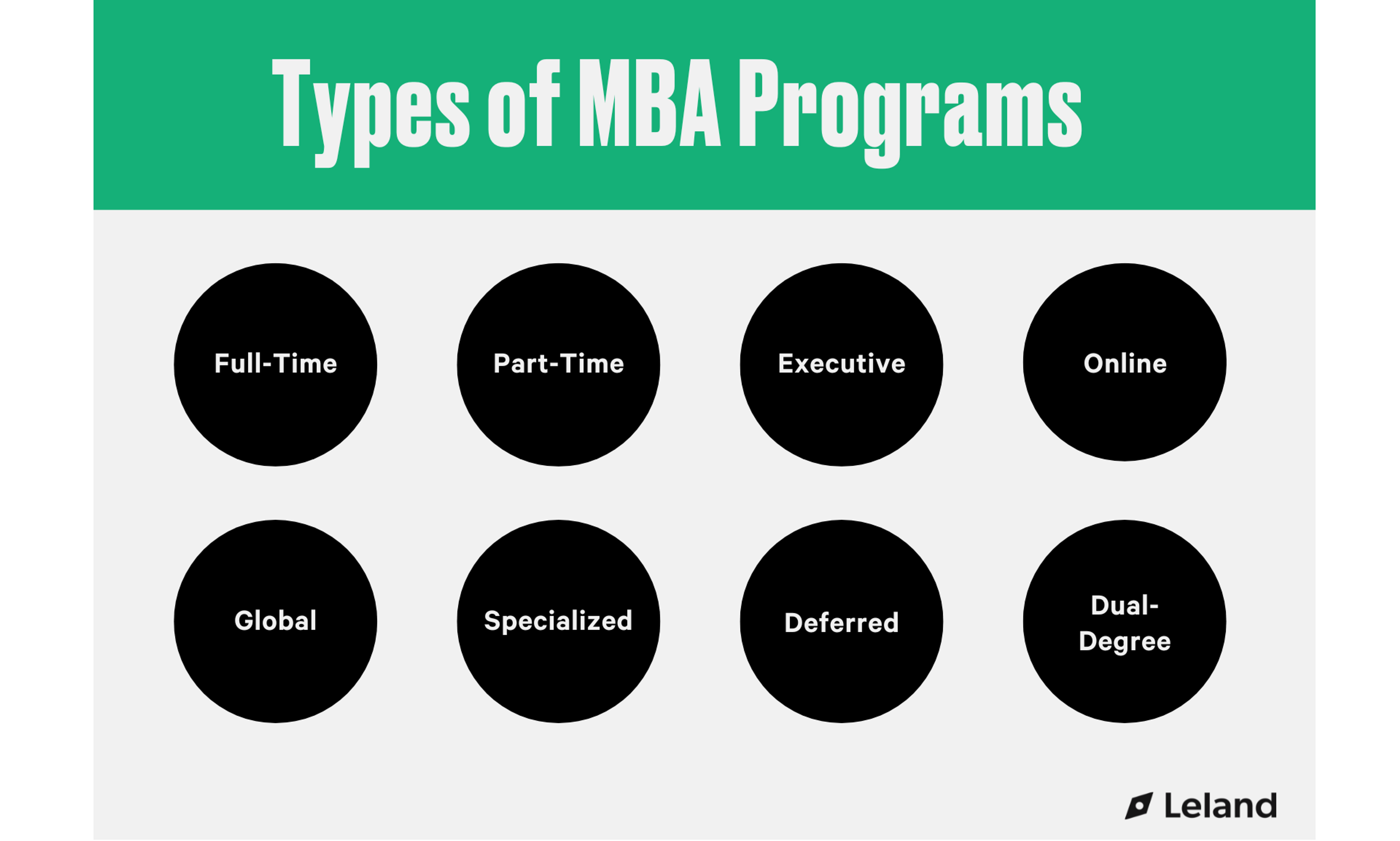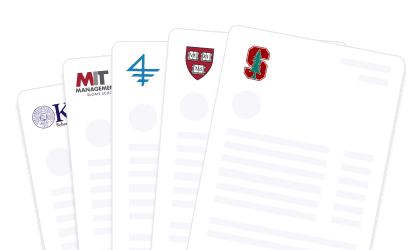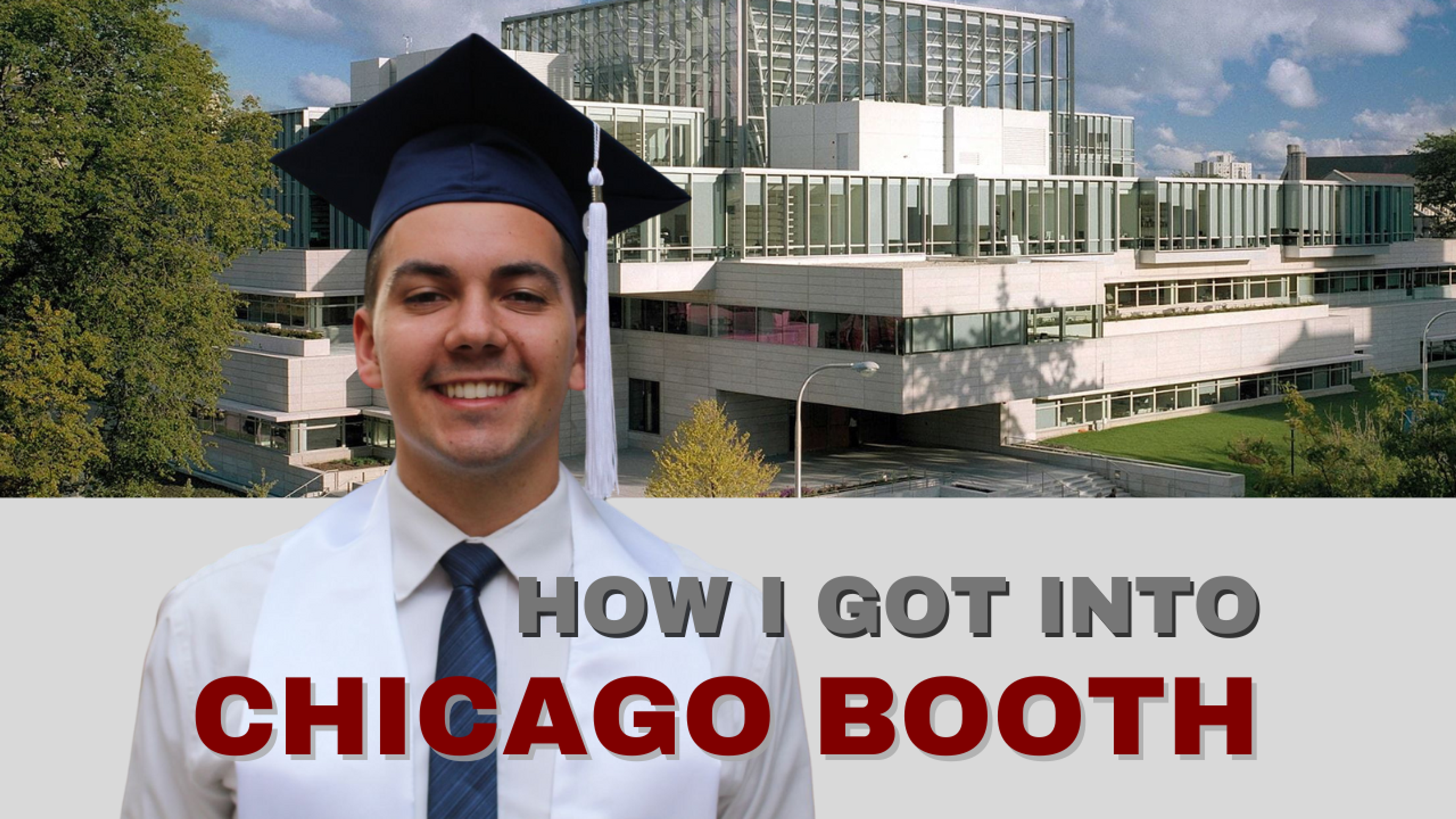
Join a free event
Learn from top coaches and industry experts in live, interactive sessions you can join for free.
Table of Contents
Are you considering attending business school for a Master’s in Business Administration but are unsure which of the multiple MBA programs is right for you? Each type of MBA program will prepare you for a successful career in business, but they each have their unique pros and cons. Read about the curriculum, career opportunities, and costs of the types of MBA programs to help you decide which MBA degree is right for you.
The Different Types of MBA Programs

Full-Time MBA Program
A full-time MBA program is the most commonly offered MBA program and prepares students for a wide variety of careers in business. A full-time MBA program usually spans two years, with students spending the first year learning about fundamental business topics such as leadership, economics, and statistics. Second-year students have more flexibility in choosing electives that hone in on their specific interests.
This MBA program offers extensive opportunities for networking, industry experience, and collaboration with other MBA students, and many programs also require students to complete a summer internship between their first and second years.
Some business schools also offer accelerated one-year, full-time MBA degrees. These accelerated full-time MBA programs are generally targeted toward professionals aiming to progress in their current careers, rather than those seeking to make significant career changes, and may have fewer opportunities for electives and hands-on experience.
A full-time MBA program may be the right for you if…
- You're seeking an immersive educational experience with a structured schedule.
- You have the flexibility to pause your career and focus solely on your studies.
- You're interested in networking opportunities and building close relationships with peers and faculty.
- You prefer face-to-face interactions and a campus environment for learning.
- You're looking for internships or career opportunities that often come with full-time programs.
- You value access to a wide range of resources, workshops, and extracurricular activities only available to full-time students.
Example: Stanford Graduate School of Business
The Full-Time MBA Program at Stanford:
- 120 Tenure line faculty members
- 120 industry practitioners
- 120+ electives
- First-year foundations, second-year electives
- Global experience requirement
Core Courses:
- Data Analysis and Decision Making
- Leading with Values
- Finance I
- Financial Accounting
- Leadership Laboratory
- Managing Groups and Teams
- Microeconomics
- Optimization and Simulation Modeling
- Organizational Behavior

Part-Time MBA Program
Are you interested in obtaining an MBA degree but don’t have the time to commit to a full-time MBA program? Part-time MBA programs allow students to take classes in the evenings or on weekends, ensuring greater flexibility for working students committed to their careers or other responsibilities. According to the Graduate Management Admission Council, flexible programs are increasingly popular among MBA students, with 56% of weekend programs and 60% of evening programs reporting application growth compared to 43% of full-time programs. A part-time MBA program may last up to five years, but students may choose to accelerate their studies by taking more courses in certain semesters or by taking summer classes.
Read: Part-Time vs. Full-Time MBA Programs: Pros, Cons, and How to Decide
A part-time MBA program may be right for you if…
- You want to continue working while pursuing your degree, maintaining your income and career trajectory.
- You need flexibility in your schedule to balance work, studies, and personal commitments.
- You're looking to apply what you learn immediately to your current job.
- You prefer taking courses in the evenings, weekends, or online to fit your busy lifestyle.
- You're self-motivated and can manage your time effectively between various responsibilities.
- You're seeking to enhance your current skill set and credentials without taking a break from your professional life.
- You value the opportunity to network with professionals who are also balancing careers and education.
Example: University of Chicago Booth School of Business
The Part-Time MBA Program at Booth:
- Part-time Evening and Weekend programs offered
- Typically completed in 2.5-3 years
- 20 courses to complete the degree, 130+ to choose from
- 14 concentrations to choose from
- 25% of the courses can be taken remotely
- Start in Fall, Winter, Spring, or Summer
Core Courses:
- Accounting
- Microeconomics
- Statistics
- Leadership Exploration and Development (LEAD)
- One course each in these areas: finance, marketing, operations, strategy, decisions, people, economy, and society
Executive MBA Program
An Executive MBA program, or EMBA program, is a specific type of part-time MBA program targeted toward more experienced professionals looking to step into higher leadership positions. Executive MBA programs tend to include more electives to help students succeed in their particular industries. Similar to other part-time MBA programs, Executive MBA programs offer classes in the evenings and weekends.
However, students are also expected to bring much more to the table, with many Executive MBA programs requiring five or more years of work experience to apply. According to the Graduate Management Admission Council, 69% of Executive MBA applicants had 10 or more years of work experience. Executive MBA programs also tend to place a stronger emphasis on leadership development and strategy courses to suit the needs of the mid-career professionals often enrolled in these programs. Many Executive MBA programs also do not have internship requirements, as students are expected to continue working in their existing roles.
An executive MBA program may be right for you if…
- You have significant managerial or leadership experience and are looking to further enhance your leadership skills.
- You're aiming to expand your strategic thinking and decision-making capabilities at a senior management level.
- You prefer a program that acknowledges and builds upon your extensive work experience.
- You're looking for a fast-paced curriculum designed for seasoned professionals.
- You want to network with peers who have similar levels of experience and leadership challenges.
- You're seeking minimal disruption to your current career, with classes typically held on weekends or in intensive modules.
- You value the opportunity to apply the learning directly to your current role, benefiting both you and your employer.
Example: The Wharton School
The Executive MBA Program at Wharton:
- Campuses in Philadelphia, San Francisco, or remote (Global cohort)
- 200+ electives, 4 majors, 700+ contact hours, 6 terms of study (22-24 months)
- 19 total credits, 10 core credits, 9 elective credits
- 12 years of average work experience
- Classes on alternate Friday/Saturday weekends
Core Courses:
- Leadership Essentials
- Foundations of Teamwork and Leadership
- Management Communication
- Responsibility in Global Management
- Analytic Foundations
- Microeconomics for Managers
- Regression Analysis for Business
- Managing the Productive Core of the Firm: Business Analytics
- Business Foundations
- Managing the Productive Core of the Firm: Operations Strategy
- Managing the Productive Core of the Firm: Quality and Productivity
- Fundamentals of Financial and Managerial Accounting
- Corporate Finance
- Macroeconomics and the Global Economic Environment
- Managing the Enterprise
- Marketing Management
- Marketing Strategy
Online MBA Program
Another flexible option for working students is an online MBA program, especially for those unable to relocate to a business school campus. Many online MBA programs include asynchronous class sessions or coursework, while still offering strong career opportunities and networks. For example, some online MBA programs offer in-person residencies for students to gain hands-on industry experience. Additionally, many business schools do not disclose whether a student was enrolled in an online MBA program or an in-person, full-time MBA program on transcripts.
An online MBA program may be the right fit for you if…
- You require the utmost flexibility to study from anywhere, without the need to relocate or commute.
- Your schedule demands the ability to access coursework and lectures at any time, fitting around your personal and professional commitments.
- You are comfortable with and can thrive in a virtual learning environment, utilizing digital tools for collaboration and communication.
- You're seeking a wider range of program options that might not be available locally or in a traditional format.
- You value the opportunity to connect with a diverse, global network of peers and instructors.
- You're looking for a cost-effective solution that potentially reduces expenses related to campus facilities or relocation.
- You're self-disciplined and can effectively manage your time and studies independently.
Read: Cheapest Online MBA Programs to Level-Up Your Career
Example: University of Michigan Ross School of Business
The Online MBA Program at Ross:
- 24.75 core credits, 17.25 elective credits
- 14-week, 6-credit Multidisciplinary Action Projects (MAP) course required
- Start in the Fall or Winter, asynchronous and synchronous study
- In-person residencies for learning experiences
- Optional in-person electives, on-campus courses, and dual-degree programs
Core Courses:
- Financial Accounting
- Managerial Accounting
- Multidisciplinary Action Projects
- Applied Microeconomics
- Business Law and Ethics
- Financial Management
- Marketing Management
- Human Behavior & Organizations
- Strategy
- Competing in Global Business
- Applied Statistics
- Intro to Operations Management
International/Global MBA Program
Most International or Global MBA programs are also usually designed for professionals with some level of prior work experience. A Global or International MBA program will prepare students to thrive in business around the world and often include study-abroad opportunities at international and foreign companies.
An international or global MBA Program may be the best fit for you if…
- You're aiming for a career with international scope or within multinational corporations.
- You value exposure to diverse cultures, business practices, and global market perspectives.
- You're interested in developing a global network of peers, mentors, and industry connections.
- You're open to opportunities for international travel, study abroad experiences, or internships with global companies.
- You seek to enhance your cross-cultural communication, negotiation, and leadership skills.
- You prefer a curriculum that includes languages and international business strategies.
- You're looking for an immersive experience that broadens your understanding of global business challenges and opportunities.
Example: University of South Carolina Darla Moore School of Business
The International MBA Program at Darla Moore:
- 22 months long, begins in July
- Global Track or Language Track (includes language study)
- Core curriculum, international business electives, and in-country experiences
- 10-15 week internship at a multinational company
Core Courses:
- Quantitative Methods
- Financial Accounting
- Leading Teams & Organizations
- Global Strategic Management
- Managing the Multinational Enterprise
- Comparative Institutional Systems
- Global Supply Chain
- Global Finance
- Global Marketing
- Managerial Accounting
- Introductory Language Training
Specialized MBA Program
Many MBA programs allow students to specialize in an area of business, such as finance, business analytics, human resources, and healthcare management. Specializing in one field allows students to spend more time focusing on their prospective career areas and demonstrate knowledge and interest to future employers.
A specialized MBA program may be the best fit for you if…
- You have a clear career focus in a specific industry or technical field, such as technology, healthcare, or finance.
- You're seeking to deepen your expertise in a particular area with a curriculum tailored to your interests and career goals.
- You value the opportunity to learn from faculty and industry leaders who are experts in their fields.
- You're looking for a program that integrates business fundamentals with specialized technical skills.
- You aim to stand out in the job market with a unique skill set that bridges the gap between business and technology.
- You're interested in accessing resources, networks, and opportunities specific to your chosen industry.
- You prefer a learning environment that fosters innovation and entrepreneurial thinking in a specialized context.
Example: NYU Stern Andre Koo Technology & Entrepreneurship MBA
The Tech MBA at NYU:
- 1-year program, from May to May
- 52 credits, including Business/Tech Core, immersion, electives, and a project
- STEM-designated degree program
- “Stern Solutions” experiential learning opportunities
Core Curriculum:
- Business Core
- Leadership
- Economics
- Marketing
- Business Communication
- Corporate Finance
- Accounting
- Strategy
- Professional Responsibility
- Tech Core
- Technical Product Management
- Dealing with Data
- Tech Evolution and Economics
- Foundations of Networks and Mobile Systems
- Entrepreneurship
- DevOps and Software Engineering
- Business Analytics

Deferred MBA Programs
Deferred MBAs are one of the newest types of programs. They target seniors in undergraduate and master's programs who do not yet have full-time work experience. Students can apply while still in school, get admitted, and then defer their matriculation for 2-5 years while they get that work experience. Schools are especially interested in securing high-potential students who may not otherwise pursue an MBA.
A deferred MBA program may be the best fit for you if...
- You are an undergraduate or master's student and do not have full-time work experience.
- You're looking for the assurance of MBA admission early in your career, allowing you to focus on gaining relevant work experience in the interim.
- You're interested in the flexibility to work in your chosen field for a few years before starting your MBA, thus applying practical insights to your studies.
- You value the opportunity to join a cohort of similarly ambitious and forward-thinking peers who have also secured their MBA admission in advance.
- You aim to leverage the deferred admission to explore career paths or entrepreneurial ventures with the security of knowing your MBA spot is waiting.
- You seek to take advantage of any mentorship, networking, or pre-MBA internships offered by the program during the deferment period.
- You're planning your long-term career trajectory with a strategic approach, integrating both professional experience and advanced education.
Read: Top 10 Deferred MBA Programs in the US—and How to Get In
Example: Northwestern Kellogg Future Leaders Deferred Enrollment Program
The Future Leaders Program at Kellogg:
- No application fees, no GMAT/GRE required
- Application includes essays, letters of recommendation, and an interview (by invitation only)
- Deferment lasts 2-5 years
- Admissions deposit is $500, then another $500 for every year of deferment
- Once matriculated, you are the same as the traditional, full-time MBA candidates
Core Curriculum:
- Leadership in Organizations
- Business Strategy
- Finance I
- Marketing Management
- Microeconomic Analysis
- Business Analytics I
- Business Analytics II
- Operations Management
- Financial Accounting
- Leadership & Crisis Management

Dual-Degree MBA Programs
Many business schools also offer dual-degree programs in partnership with other graduate schools for students interested in multiple fields. These programs tend to be longer and more rigorous, but prepare students for success in a wide range of areas.
A joint or dual-degree MBA program may be the best fit for you if…
- You're interested in combining business acumen with expertise in another field, such as law, medicine, engineering, or public policy.
- You aim to pursue a career that intersects with multiple disciplines, requiring a broader range of skills and knowledge.
- You're looking for a comprehensive educational experience that provides credentials in both business and another specialization.
- You're willing to invest additional time and effort to complete the requirements of two degrees, often in a shortened timeframe compared to pursuing them separately.
- You value the opportunity to network and collaborate with peers across diverse academic and professional backgrounds.
- You seek to differentiate yourself in the job market with a unique combination of skills and qualifications.
- You're interested in tackling complex challenges that require interdisciplinary approaches and solutions.
DDS/MBA, DMD/MBA, DO/MBA and MD/MBA Programs
Obtaining an MBA alongside a dental or medical degree is a great way for future dentists and physicians to prepare for a career in the expanding overlap between healthcare and business, such as managing a hospital, owning a private practice, or consulting for pharmaceutical companies.
JD/MBA Program
A JD/MBA dual-degree is a highly flexible degree that prepares students for a wide variety of careers in the intersection of business and law. JD/MBA degrees are typically academically rigorous and take between three to five years to complete.
MPP/MBA and MPA/MBA Programs
For students passionate about public policy issues affecting both government and businesses, combining an MBA degree with a Master's in Public Policy or Public Administration may be the right fit. These dual-degree programs usually last three years and place a strong emphasis on policy research and leadership, preparing graduates for successful careers in public service.
Other Master's/MBA Programs
Many institutions offer other MBA degrees in conjunction with other Master's degrees, such as MAs and MSs in International Studies, Engineering, Mathematics, Urban Planning, Architecture, Education Policy, and Biotechnology. These joint degrees typically take two to four years to complete and may require separate applications to the institution’s business school and the graduate school offering the other Master's program.
Read: The Top MS/MBA Dual-Degree Programs and How to Get In
Example: Harvard Business School
- JD/MBA with Harvard Law School
- MBA/DMD with Harvard School of Dental Medicine
- MBA/MPP with Harvard Kennedy School
- MD/MBA with Harvard Medical School
- MS/MBA in Engineering Sciences with Harvard School of Engineering and Applied Sciences
- MS/MBA in Biotechnology: Life Sciences with Harvard Graduate School of Arts and Sciences
Key Takeaways
- An MBA degree is a powerful way to advance your career in business and can take you far in multiple fields of business.
- Many programs allow for flexibility in time and courses, allowing students to hone in on their particular interests while balancing their careers.
- When debating which MBA program is right for you, consider your current career, the level of commitment you can make to an MBA program, and your career goals after graduating from business school.
- The different types of MBA programs include two-year full-time, accelerated one-year, part-time, executive, online, specialized, and joint/dual-degree.
Final Thoughts
Choosing the right type of MBA is about more than checking boxes; it’s about aligning your education with your goals, lifestyle, and the kind of leader you want to become. Whether you're pivoting industries, moving into leadership, or deepening your expertise, the right MBA format can open doors and accelerate your path forward.
Work with a top MBA admissions coach who’s helped applicants navigate this exact decision—and get into top full-time, part-time, and executive MBA programs. Browse MBA admissions coaches here.
Read:
- What is an MBA Degree? An Expert Guide
- MBA Requirements: What You Need to Apply (and What Top Programs Really Look For)
- Top 25 Business Schools’ Acceptance Rates and Class Profiles (2023)
- A Comprehensive MBA Application Timeline—With Chart
- The Top 25 MBA Programs—Acceptance Rates, Tuition, and More
FAQs
What’s the difference between a full-time and part-time MBA?
- A full-time MBA is immersive and usually takes 1–2 years, while a part-time MBA lets you keep working and takes longer to complete. The choice depends on your schedule, goals, and how quickly you want to pivot or advance.
Is an executive MBA worth it if I already have years of experience?
- Yes. EMBAs are designed for experienced professionals looking to level up into senior leadership. The classes, peers, and projects are all tailored to people already managing teams or functions.
Can I work full-time while doing an online MBA?
- Absolutely. That’s one of the main benefits. Online MBAs are built for flexibility, often with asynchronous classes, so you can take on your own schedule.
What’s a deferred MBA, and how do I know if I qualify?
- A deferred MBA lets you apply as a college senior or grad student and then start the program after working for a few years. If you’re graduating soon and want a guaranteed spot later, it’s a great option.
Should I do a dual-degree MBA program?
- If you’re interested in combining business with another field—like law, medicine, or policy—a dual degree can be a smart way to build a unique skill set. Just be ready for a more intense time commitment.
Which type of MBA is best for career changers?
- Full-time MBAs tend to be best if you’re making a big pivot, especially with the support of internships, recruiting pipelines, and a strong alumni network.
Browse hundreds of expert coaches
Leland coaches have helped thousands of people achieve their goals. A dedicated mentor can make all the difference.


























